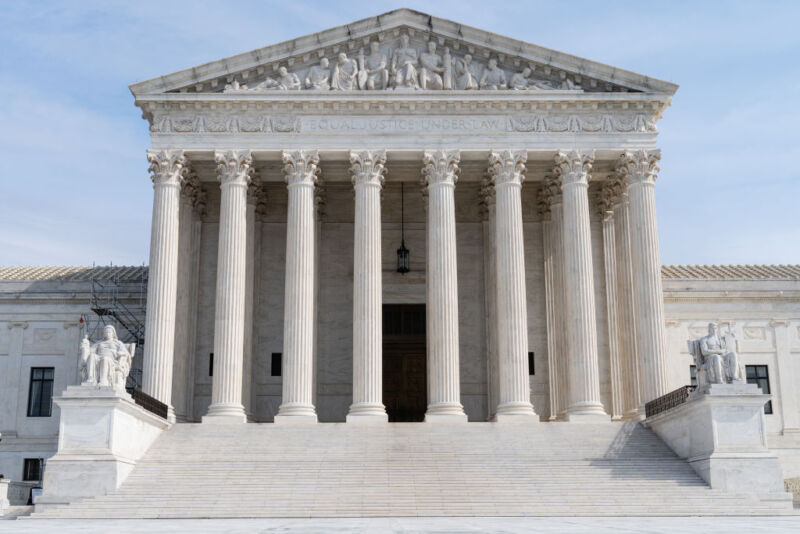SCOTUS spares Section 230, rules Google, Twitter not liable for aiding ISIS

Today the United States Supreme Court quashed tech industry fears that the nation’s highest court might ruin the Internet by deciding that platforms should be held liable for recommending third-party content that has long been protected by Section 230 of the Communications Decency Act.
In a pair of rulings, the Supreme Court found that plaintiffs failed to state a claim when arguing that online platforms like YouTube, Twitter, and Facebook should be held liable for aiding and abetting the Islamic State of Iraq and Syria (ISIS) terrorist enterprise by recommending terrorist content ahead of attacks. As a result, both cases, Twitter v. Taamneh and Gonzalez v. Google, have been remanded to a lower court, and at least for now, the Section 230 immunity shield remains fully intact.
Supreme Court Justice Clarence Thomas delivered the opinion in the Twitter case. He concluded that allegations that Facebook, Twitter, and YouTube knew for years that “ISIS was using their platforms but failed to stop it from doing so” were “insufficient”—even without considering Section 230 protections—to establish that the social platforms aided and abetted a specific 2017 terrorist attack on the Reina nightclub in Istanbul, Turkey. That attack, carried out for ISIS by Abdulkadir Masharipov, killed 39 victims and injured another 69.
Plaintiffs in that case argued that social platforms can be held liable for generally aiding and abetting ISIS—and profiting from “advertisements placed on ISIS’ tweets, posts, and videos.” But the Supreme Court found that plaintiffs fell “short” of proving their Anti-Terrorism Act (ATA) claims that platforms gave “knowing and substantial assistance” to ISIS.
“Notably, plaintiffs never allege that ISIS used defendants’ platforms to plan or coordinate the Reina attack; in fact, they do not allege that Masharipov himself ever used Facebook, YouTube, or Twitter,” Thomas wrote in his opinion.
Instead, plaintiffs sought to hold tech companies liable for “creating their platforms and setting up their algorithms to display content relevant to user inputs and user history,” Thomas wrote, which led them to recommend terrorist content like propaganda and recruitment materials to users. Apart from blocking some ISIS content, Thomas wrote, there is “no reason” to think that “defendants selected or took any action at all with respect to ISIS’ content.” And allegations that “Google reviewed and approved ISIS videos on YouTube as part of a revenue-sharing system and thereby shared advertising revenue with ISIS” alleged “nothing about the amount of money that Google supposedly shared with ISIS, the number of accounts approved for revenue sharing, or the content of the videos that were approved.”
Because platforms’ algorithms “appear agnostic”—”matching any content (including ISIS’ content) with any user who is more likely to view that content”—platforms were only allegedly guilty of standing back and watching as terrorist content spread on their platforms, Thomas wrote. That’s a “far cry” from proving that platforms were consciously or substantially trying to help ISIS or participate in the Reina attack, the court decided, making platforms instead appear to be passive bystanders.
“There are no allegations that defendants treated ISIS any differently from anyone else,” Thomas wrote. “Rather, defendants’ relationship with ISIS and its supporters appears to have been the same as their relationship with their billion-plus other users: arm’s length, passive, and largely indifferent.”
The ATA does not hold passive bystanders liable for terrorist activity. If it did, then email, cell phone, Internet, or any sort of communications providers—including mail delivery services—would all be liable for terrorist attacks, the court decided.
Further, finding otherwise would “necessarily hold defendants liable as having aided and abetted each and every ISIS terrorist act committed anywhere in the world,” Thomas’ opinion said. Partly because plaintiffs did not show that any platform “consciously and selectively chose to promote content provided by a particular terrorist group” or had some legal duty to remove ISIS content, their allegations “certainly fall short,” Thomas wrote.
“There is no allegation that the platforms here do more than transmit information by billions of people, most of whom use the platforms for interactions that once took place via mail, on the phone, or in public areas,” Thomas wrote. “The fact that some bad actors took advantage of these platforms is insufficient to state a claim that defendants knowingly gave substantial assistance and thereby aided and abetted those wrongdoers’ acts.”
Because the claims raised in the other case, Gonzalez v. Google, depended on the Supreme Court ruling in favor of plaintiffs in Twitter v. Taamneh, the court ruled that Gonzalez v. Google also failed to state a claim under the ATA.
Attorneys for the Taamneh and Gonzalez families, Twitter, and Facebook owner Meta did not immediately respond to Ars’ request for comment.
Google’s general counsel, Halimah DeLaine Prado, told Ars that “countless companies, scholars, content creators and civil society organizations who joined with us in this case will be reassured by this result. We’ll continue our work to safeguard free expression online, combat harmful content, and support businesses and creators who benefit from the Internet.”
https://arstechnica.com/?p=1940290